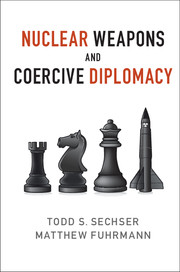Book contents
- Frontmatter
- Dedication
- Contents
- List of Tables
- List of Figures
- Acknowledgements
- Part I The Logic of Nuclear Skepticism
- Part II Trends
- Part III Cases
- Roadmap for Part III
- 5 Brinkmanship Busts: When Nuclear Coercion Fails
- 6 Think Again: Reassessing Nuclear Victories
- Part IV Conclusions
- Appendix: Methods and Data
- References
- Index
6 - Think Again: Reassessing Nuclear Victories
from Part III - Cases
Published online by Cambridge University Press: 16 February 2017
- Frontmatter
- Dedication
- Contents
- List of Tables
- List of Figures
- Acknowledgements
- Part I The Logic of Nuclear Skepticism
- Part II Trends
- Part III Cases
- Roadmap for Part III
- 5 Brinkmanship Busts: When Nuclear Coercion Fails
- 6 Think Again: Reassessing Nuclear Victories
- Part IV Conclusions
- Appendix: Methods and Data
- References
- Index
Summary
The previous chapter analyzed clear failures of nuclear coercion. We showed that in six serious nuclear crises, and three less severe cases, countries failed to coerce their adversaries despite engaging in nuclear brinkmanship. In this chapter, we turn our attention to cases in which nuclear blackmail seemingly worked. These crises are apparent outliers for nuclear skepticism theory and fertile ground for evidence in support of the nuclear coercionist school. Indeed, the leaders involved in these episodes – as well as many scholars who have studied them – asserted that nuclear weapons were useful for military blackmail.
However, it is important to treat leaders' claims about nuclear coercion with some caution. Heads of state have political and psychological incentives to declare victory, so their claims of success cannot always be taken at face value. Consider the 1946 Iran crisis, during which President Truman allegedly issued the first coercive nuclear threat of the post–World War II era. “We're going to drop it on you,” the president purportedly told Soviet Foreign Minister Andrei Gromyko, unless Soviet troops were removed from northern Iran within forty-eight hours. In his memoirs, Truman implies that his “blunt message” forced the Soviets out of Iran. If true, this would be clear evidence of nuclear blackmail at work. There is only one problem with Truman's threat: he never actually made it.We now know that he (and others) either invented a story about a nuclear ultimatum or misremembered how events actually transpired. This episode provides a cautionary lesson to scholars: when evaluating whether nuclear coercion works, it is important to comprehensively examine the historical record, not just rely on assertions from crisis participants. This chapter evaluates claims about nuclear coercion by analyzing a large body of evidence – including declassified documents whenever possible.
We critically assess ten crises that are widely regarded as successful instances of nuclear coercion, focusing our attention on the seven most serious cases. None of these crises provides unequivocal evidence that nuclear coercion works. In each instance, at least one of three factors mitigates the conclusion that a nuclear threat resulted in a coercive victory.
- Type
- Chapter
- Information
- Nuclear Weapons and Coercive Diplomacy , pp. 173 - 232Publisher: Cambridge University PressPrint publication year: 2017



